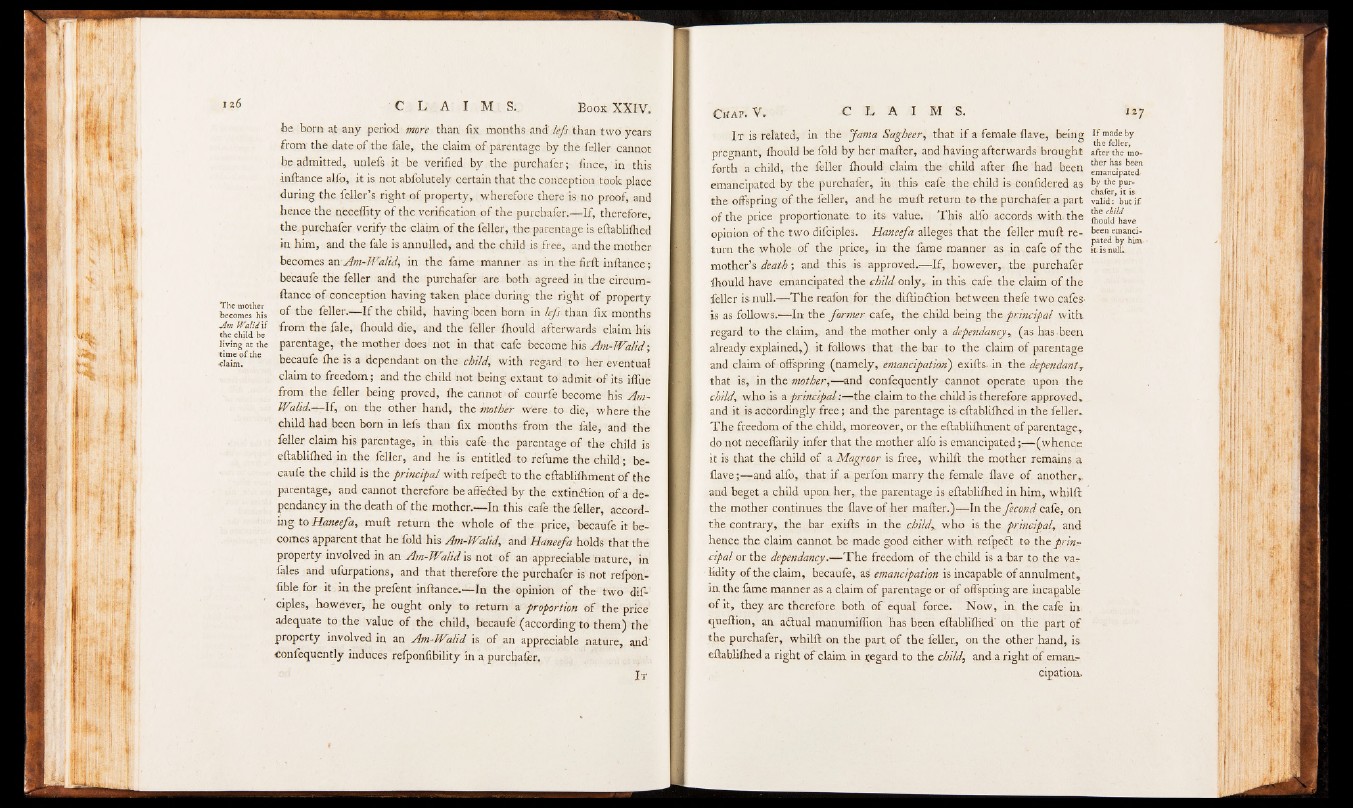
The mother
becomes his
Jim Waltd i f
the child be
living at the
time o f the
claim.
lie bora at any period more than fix months and lefs than two years
from the date of the tale, the claim of parentage by the feller cannot
be admitted, unlefs it be verified by the purchafer; fince, in this
inftance allb, it is not abfolutely certain that the conception took place
during the feller’ s right of property, wherefore there "is no proof, and
hence the necefiity of the verification of the purchafer.— If, therefore
thepurchafer verify the claim of the feller, the parentage is eftablifhed
in him, and the fale is. annulled, and the child is free, and the mother
becomes 2.0. Am-Walid, in the fame manner as in the firft inftance;
becaufe the feller and the purchafer are both agreed in the circum-
ftance of conception having taken place during the right of property
of the feller.— If the child, having .been born in lefsi than fix months
from the fale, fhould die, and the feller fhould afterwards claim his
parentage, the mother does not in that cafe become his Am-Walid;
becaufe the is a dependant on the child, with regard to her eventual
claim to freedom; and the child not being extant to admit of its iflue
from the feller being proved, the cannot of courfe become his Am-
Walid.— \f, on the other hand, the mother were to die, where the
child had been born in lefs than fix months from the fale, and the
feller claim his parentage, in this cafe the parentage of the child is
eftablifhed in the feller, and he is entitled to refume the child; becaufe
the child is the principal with refpect: to the eftablifhment of the
parentage, and cannot therefore be affected by the extinction of a de-
pendancyin the death of the mother.— In this cafe the feller, according
to Haneefa, muft return the whole of the price, becaufe it becomes
apparent that he fold his Am-Walid, and Haneefa holds that the
property involved in an Am-Walid is not of an appreciable nature, in
fales and ufurpations, and that therefore the purchafer is not refpon-
fible for it in the prefent inftance.— In the opinion of the two dif-
ciples, however, he ought only to return a proportion of the price
adequate to the value of the child, becaufe (according to them) the
property involved in an Am-Walid is of an appreciable nature, and
confequently induces refponfibility in a purchafer.
It
I t is related, in thé Jama Sagheer, that if a female Have, being
pregnant, fhould be fold by her mafter, and having afterwards brought
forth a child, the feller fhould claim the child after fhe had been
emancipated by the purchafer, in this cafe the child is confidered as
the offspring of the feller, and he muft return to the purchafer a part
of the price proportionate to its value. This alfo accords with, the
opinion of the two difciples. Haneefa alleges that the feller muft return
the whole of the price, in the fame manner as in cafe of the
mother’s death ; and this is approved.:— If, however,, the purchafer
fhould have emancipated the child only, in this cafe the claim of the
feller is null.— The reafon for the diftinction between thefe two cafes
is as follows.— In the former cafe, the child being the. principal with
I. regard to the claim, and the mother only a dependaney, (as has been
already explained,) it follows that the bar to the claim of parentage
and claim of offspring (namely, emancipation) exifts- in the dependant,
that is, in the mother,— and confequently cannot operate upon the
child, who is a principal:—the claim to the child is therefore approved,
and it is accordingly free ; and the parentage is- eftablifhed in the feller-
The freedom of the child, moreover, or the. eftablifhment of parentage,,
do not neceflkrily infer that the mother alfo is emancipated — (whence
it is that the child of a Magroor is free, whilft the mother remains a
flave;— and alfo, that if a perfon marry the female flave of another,
and beget a child upon. her,, the parentage is eftablifhed in him, whilft
the mother continues the flave of her mafter.)— In the fécond cafe, on
the contrary, the bar exifts in the child, who is. the principal, and
hence the claim cannot be made good either with refpect to the principal
or the dependaney.— T h e freedom of the child is a bar to the var
lidity of the claim, becaufe, aS emancipation is incapable of annulment,
in. the fame manner as a claim of parentage or of offspring are incapable
of it, they are therefore both of equal force. Now, in. the cafe in
queftion, an aftual manumiflion has been eftablifhed' on the part of
the purchafer, whilft on the part of the feller, on the other hand, is
eftablifhed a right of claim in Regard to the child, and a right of emancipation.
I f made by
the feller,
after the mother
has been
emancipated,
by the purchafer,
it is
valid: but i f
the child
fhould have
been emancipated
by him-
i t is nulL